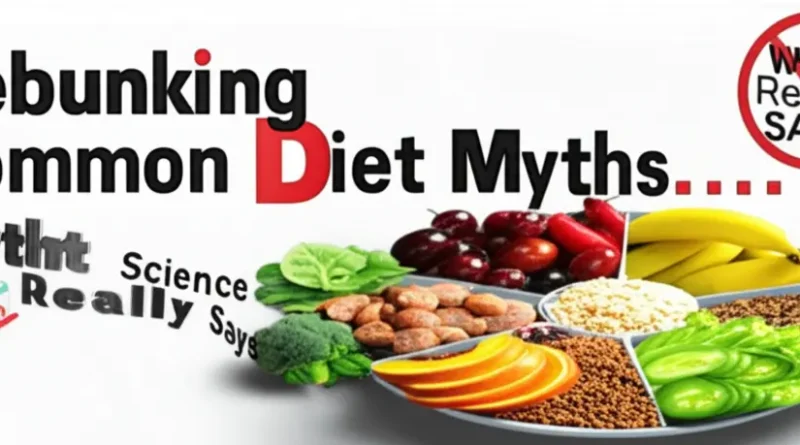Debunking Common Diet Myths: What Science Really Says
In today’s fast-paced world, the quest for a healthy diet often leads to confusion, misinformation, and fad trends. While everyone desires to eat healthily and maintain a suitable weight, various diet myths persist, hindering our nutritional choices. In this post, we will expose many common diet myths and highlight the scientific evidence that debunks them.
Myth 1: Carbs Are the Enemy
One of the most widespread beliefs is that all carbohydrates lead to weight gain. However, not all carbs are created equal. Whole grains, fruits, and vegetables provide essential nutrients and fiber that are vital for a balanced diet. Research shows that complex carbohydrates can aid in weight management and lowering the risk of chronic diseases. It is the overconsumption of refined carbs and sugars that contribute to health issues, not carbs themselves.
Myth 2: Fats Make You Fat
Another myth is that consuming fats automatically leads to weight gain. In reality, healthy fats—such as those found in avocados, nuts, and olive oil—are crucial for nutrient absorption, hormone production, and overall body function. Studies have shown that incorporating healthy fats into your diet can actually aid in weight loss and promote heart health when consumed in moderation.
Myth 3: Skipping Meals Helps with Weight Loss
Many believe that skipping meals will help them shed pounds quickly. However, this approach often has the opposite effect. Skipping meals can slow down your metabolism and lead to increased hunger, prompting a potential binge at the next opportunity. Research suggests that regular, balanced meals help maintain energy levels and can assist in weight management.
Myth 4: All Caloric Intake is Equal
Calories are not the only factor in weight management. The source of those calories is equally important. For instance, 100 calories from a candy bar does not provide the same nutritional benefits as 100 calories from broccoli. A diet high in nutrient-dense foods can promote better health outcomes, while consuming empty calories can lead to various health issues.
Myth 5: “Detox” Diets Cleanse Your Body
Detox diets claim to flush out toxins and promote weight loss. However, the human body is naturally equipped with powerful detoxification systems, primarily the liver and kidneys, which effectively filter and eliminate toxins. Most detox diets are not scientifically validated and can lead to nutrient deficiencies if followed long-term. A balanced diet rich in whole foods is the best way to support your body’s natural detox processes.
Myth 6: Gluten-Free Diets are Healthier
The belief that gluten-free diets are inherently healthier has gained popularity, especially among those without a gluten intolerance or celiac disease. A gluten-free diet can be lacking in essential nutrients and fiber found in whole grains. Research indicates that for those who do not suffer from gluten-related disorders, eliminating gluten may not lead to health improvements and can result in disordered eating habits.
Myth 7: Supplements Can Replace Healthy Eating
With the rise of nutritional supplements, some believe they can substitute for a healthy diet. While supplements can play a role in addressing specific deficiencies, they cannot replicate the myriad benefits of whole foods. Whole foods provide a unique combination of vitamins, minerals, fiber, and other compounds that work synergistically to promote health.
Myth 8: Eating Late at Night Causes Weight Gain
Many people worry about eating late at night, fearing it will lead to weight gain. However, it is not the timing of meals that affects weight but rather the total calorie intake throughout the day. Studies have found that late-night eating does not have a significant impact on weight when overall calorie consumption is controlled, emphasizing the quality and quantity of food rather than when it is consumed.
As we navigate through the wealth of dietary information available today, it’s vital to differentiate between fact and myth. Incorporating a variety of whole foods into your diet, maintaining a balanced intake of nutrients, and fostering a positive relationship with food are crucial steps toward optimal health. Keep in mind, always consult with a healthcare provider or a registered dietitian when making significant changes to your diet!

